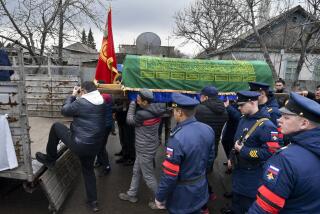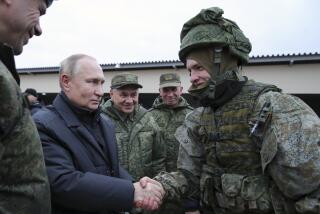Iraq Says Soviet Workers Can Go : Gulf crisis: But Baghdad demands compensation for canceled labor contracts. 3,300 people are involved. Moscow says the move will not soften its resolve.
- Share via
AMMAN, Jordan — Moving to deflect a rising threat, Iraqi authorities announced Tuesday that all 3,300 Soviet workers can leave the country if Moscow meets certain conditions.
The decision by the ruling Revolutionary Command Council demanded that Moscow compensate Baghdad for terminating the labor contracts of the Soviet workers. If the Kremlin agrees, the men will be free to leave today, according to a Baghdad report from the Iraqi News Agency.
Soviet officials in Moscow said they have received no official notice of the move and indicated that it will not soften the Soviet stand on Iraq’s invasion of Kuwait, news agencies reported. And they said they have no doubt that Soviet citizens have been prevented from leaving Iraq.
“We have absolutely positive information that hundreds of people are being denied exit visas to leave Iraq,” Vitaly Ignatenko, a presidential spokesman, was quoted as saying. “Our leadership insists on the timely provision of exit visas for all these Soviet citizens.
“We are very interested in seeing all of our people home. If today we get a report that the Iraqi leadership has provided our comrades with all the necessary papers, then today we shall send a charter plane,” Ignatenko said.
“Unfortunately we have had no signals that could inspire such a hope.”
The Soviet workers, primarily oil field technicians, have not been labeled Iraqi “guests,” foreigners held as hostages against a possible military attack, but President Saddam Hussein’s government has refused to let key personnel leave until they complete their contracts.
Late last week, Foreign Minister Eduard A. Shevardnadze warned that Moscow would commit armed forces to the Persian Gulf region if the remaining Soviet workers were threatened. “Everyone should know that we will not hesitate to use force to protect our citizens,” he said in Moscow, directing his threat to Hussein’s regime in Baghdad.
Iraq responded Sunday by saying Shevardnadze’s remarks were “aimed at finding a justification to send Soviet troops to the region,” where American-dominated multinational forces confront the Iraqi army across the Saudi frontier with occupied Kuwait.
“The Soviet leadership will lose much of its friendship’s credibility with 200 million Arabs if Soviet activity goes further than it has so far,” an Iraqi Foreign Ministry spokesman said.
But Foreign Ministry spokesman Vitaly Churkin told a news briefing Tuesday that the Soviet Union has no plans to use force against Iraq.
“These insinuations have nothing to do with reality. . . . The Soviet Union does not have any plans to use its own forces in the gulf or any place else,” Churkin said.
That an Iraqi decision to allow Soviet citizens to leave would not soften the Soviet position was made clear by presidential spokesman Ignatenko.
“The Soviet Union supports all resolutions of the United Nations Security Council and bears full responsibility for applying those resolutions, not only before its own people but before the world community,” Ignatenko said.
Despite the hard Soviet line against the invasion of Kuwait, the Iraqi government has spared the Kremlin the harsh attacks leveled at Washington and London, avoiding a provocation that might bring Soviet forces into a military situation that is already disadvantageous for Iraq.
With the temperature rising between Baghdad and Moscow, the ruling council made the decision to permit the remaining workers to leave. It was taken, said an unidentified spokesman quoted by the news agency, to keep the issue “away from distortion and ambiguity, and away from the deals that certain Soviet officials are regretfully striking.”
The relationship between Hussein and Moscow deteriorated overnight when the Iraqi president sent his army into Kuwait on Aug. 2. Before and during Iraq’s 1980-88 war with Iran, the Soviets armed and trained the Iraqi army, which became an Arab model for Soviet military strategy.
But the collapse of Moscow’s East European empire over the last two years signaled the end of the Cold War and the ability of Arab states to play East against West in bargaining for support.
At the time of the Kuwait invasion, the number of Soviet technicians and their families in Iraq had fallen to about 9,000, including several hundred military advisers. In the first three months of the confrontation, more than half, mainly women and children, returned to the Soviet Union.
The remainder, critical to Iraq’s industrial and military establishments, began encountering problems in applying for required exit permits, even when their work contracts had expired, diplomats in Baghdad say. Quiet pressure from Moscow failed to break the deadlock, they said.
According to press reports, Sarkis Arkilian, an official of the Soviet Oil Ministry, has been in Baghdad for the past week attempting to solve the problem. Iraqi Foreign Minister Tarik Aziz, during a Kremlin visit last week, reportedly told the Soviets that delays were probably a bureaucratic misunderstanding.
Then Friday, the day after Moscow supported the U.N. Security Council resolution setting an ultimatum for Iraq to withdraw from Kuwait or face the prospect of war, Shevardnadze went public with the dispute, heightened by the Soviet vote.
Baghdad diplomats presume that the Soviets want to leave, but reporters working there have no way of confirming that opinion. Most foreign workers in Iraq are permitted to exchange their local currency salaries for U.S. dollars or other hard currencies, one of the benefits of working there.
However, from the Kremlin point of view, Soviet citizens on Iraqi soil could restrict Moscow’s flexibility in its political policies.
According to Baghdad diplomats, the Soviet workers have grumbled about their situation, primarily the pay formula. Oil technicians are paid 500 Iraqi dinars a month, about $1,650, but Soviet authorities receive 300 dinars of the total, the diplomats said. One reported that the formula was recently changed to give the worker 300 and Moscow 200.
According to press reports from Moscow, Foreign Ministry spokesman Churkin told reporters Monday that 40 Soviet military advisers remain in Iraq, and Baghdad will not release them from their contracts to teach Iraqi soldiers how to use and maintain Soviet-made weapons.
The Iraqis’ best tank is the Soviet T-72. Their air force has a range of Soviet-made MIG fighters, including the high-performance MIG-29. Perhaps most important, considering the Western air threat, are the Soviet-supplied surface-to-air missile batteries.
It was not clear in the Baghdad statement whether the military advisers would be free to leave.
The Iraqis have been firm on labor contracts during the crisis, even for nationalities given permission to leave the country. A foreign doctor at one of Baghdad’s major hospitals said recently that he wanted to leave immediately but had been denied an exit permit because he had three months to go on his contract.
More to Read
Sign up for Essential California
The most important California stories and recommendations in your inbox every morning.
You may occasionally receive promotional content from the Los Angeles Times.













